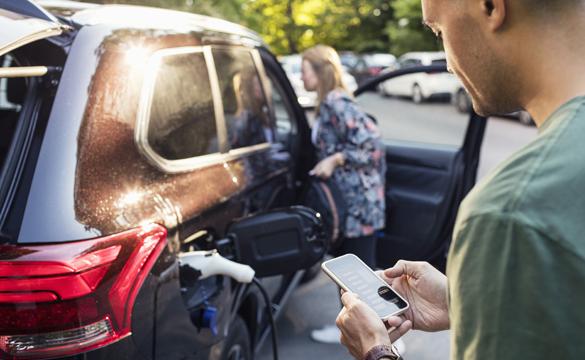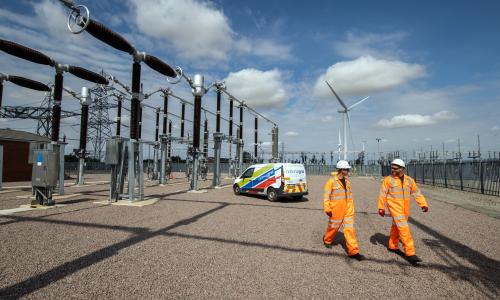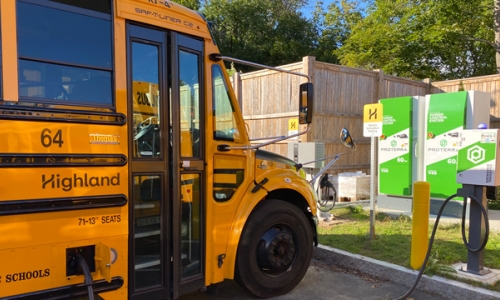
Net Zero know-how: EVs will accelerate people's energy understanding
The changeover to electric vehicles, coupled with the national roll-out of smart meters, will put people in the driving seat when it comes to managing energy use cleanly and efficiently. Here’s why.

While we all know we need energy to heat our homes and power our hot water, most of us also tend to associate it with negatives like bills and broken boilers on wintry days.
Or, as our Transport Decarbonisation Director Graeme Cooper puts it: “The problem with electricity is you can’t see it, smell it or touch it. Then you get a bill for it – a sheet of numbers you don’t understand and a figure for what to pay.”
But when you get behind the wheel of an electric vehicle (EV), you begin to fully understand what kilowatts (kW) translate to in terms of speed and distance.
“By knowing how big the battery is and how powerful the motor is, I now have a better connection with energy,” says Graeme, who’s worked in the energy industry for 15 years. “I now know what 75kW hours really mean – 200 miles – and that 250kW means 0-60 in under 6 seconds!”
Graeme sees the transition to electric cars as the gear change to people understanding energy consumption first hand – and therefore beginning to explore the energy and money-saving changes they can make to their lifestyles.
Starting your personal energy journey
Making the shift to an EV makes energy into something tangible and gets people interested in finding out which are the cheapest charging times. This real-time understanding makes them more aware of how to use energy more efficiently, for example by charging their EVs at night when energy is cheap and plentiful. It can also prompt them to find cleaner ways to power their cars, and homes, through solar panels or a heat pump, for example.
This is probably the most fundamental change in our energy system we’ve ever seen, with electric cars as the trailblazers and smart digital as the glue connecting people to their energy.
“Energy stops becoming a necessary evil when you can become a participant,” says Graeme. “The term I like to use is ‘democratisation of energy’. This is a paradigm shift. This is probably the most fundamental change in our energy system we’ve ever seen, with electric cars as the trailblazers and smart digital as the glue connecting people to their energy.”
Laura Rainey, Smart Business Lead, who runs National Grid Ventures’ smart meter business, agrees that electric vehicles will fundamentally change how people see energy. “People still talk in pence per mile and we all know how many miles to the gallon our traditional cars use, so now electric cars will pioneer how people make better green energy decisions,” she says.
But the crucial link between the better understanding of energy EVs will impart to their owners and making more informed decisions that will help to lower carbon emissions is smart meters.
Smart meters keep you on track
“On a personal level, smart meters let people have immediate visibility and therefore control over how they use energy, which can mean that how they choose to use energy becomes more efficient, cheaper and reduces emissions,” says Laura.
Smart meters also support the worldwide transition to a low-carbon energy system, by unlocking new approaches to managing demand. These include smart ‘time of use’ tariffs to incentivise people to save money by using energy outside early morning and evening peak times, when electricity is plentiful and therefore cheaper.
“People take control when they can take advantage of low-price tariffs and charge their EVs at night or automate their washing machine to go on at night, when energy is plentiful and therefore much cheaper,” explains Laura.
“At a national level, smart meters can help the transition to a cleaner energy system.”
If every home and business in Britain had a smart meter, it would make it possible to measure the amount of energy we use as a country, where we use it and when. Through regular meter readings, smart meters can paint a picture of national energy use and demand – in close to real time. Having an accurate understanding of electricity and gas, allowing for peaks and troughs of demand and supply, is vital if the country is to move to 100% renewable energy.
Accelerating to new green energy sources
By 2024, all households and small and medium sized business premises will have been offered the opportunity to have a smart meter installed, as part of the nationwide rollout. Latest government figures reveal there are 22.2 million smart and advanced meters operating in homes and small businesses in Great Britain, and 33% of all meters are now smart.
The last word goes to Graeme. “You end up creating the perfect relationship between smart generation at one end and smart consumption at the other, with National Grid in the middle making that magic happen.”



